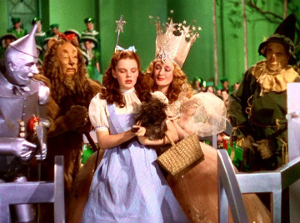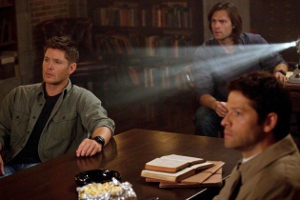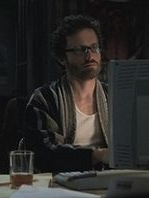My Pulp-Action Recipe
Writing Action & Adventure
Saturday, January 18, 2020 3:11 pm
This past week I finished writing An Uncommon Day at the Lake, a Hamlin Becker tale that I hope to sell to StoryHack.
StoryHack is, as it calls itself, a magazine of "Action & Adventure." This means no tales of navel-gazing and nihilism and ponderous puffery. It also means tales generally free of current-year correctness, a thing that hates fun and other natural human ways of being and is hardly interested in action and adventure.
StoryHack is, as it calls itself, a magazine of "Action & Adventure." This means no tales of navel-gazing and nihilism and ponderous puffery. It also means tales generally free of current-year correctness, a thing that hates fun and other natural human ways of being and is hardly interested in action and adventure.
In Which I Criticize the Great Stanislaw Lem
Just to Set the Internet Straight
Thursday, August 8, 2019 11:03 am
At least two people on the internet — let's call them Bob and Ted — have been dissuaded from reading Stanislaw Lem. That is a shame; not least because, as usually happens on the internet, they are reacting to something that isn't true.
The Glad Game
Give Pollyanna Her Due
Thursday, August 9, 2018 3:02 pm
In the midst of an article about something I've forgotten, I came across this, which, because it irked me, I copied down:
Many of us, myself included, preach optimism, positive thinking, and looking at the glass as half full. However, there's a difference between that and being a Pollyanna who looks at the world through rose-colored glasses.Ah, poor Pollyanna. She is one of those literary characters who, having become an allusion, has ceased being her actual self. I, too, once reductively thought of Pollyanna as a person imperviously deluded about the goodness of the world. Then I read the book.
No, Not That Kind of Pulp
Here's the Kind I Mean
Tuesday, November 21, 2017 10:53 am
Old pulp has a reputation as vulgar, trashy, lurid, and low; and in their apologetics, the proponents of new pulp are usually quite aware of that reputation.
Sometimes the apology is an outright apology. Some proponents, for example, explicitly disavow the "racism" and "misogyny" of old pulp. Well, okay. I'm not here to hate races or women, either. But declaring against "racism" and "misogyny" is a concession to the very Stalinist conformity that has been destroying our fiction. Those words are no longer reasonable; the enemy has defined them. These days, putting a woman in a dress and saying she is not the same thing as a man is considered "misogyny." Virtue signaling is not the path to better fiction.
Sometimes the apology is an outright apology. Some proponents, for example, explicitly disavow the "racism" and "misogyny" of old pulp. Well, okay. I'm not here to hate races or women, either. But declaring against "racism" and "misogyny" is a concession to the very Stalinist conformity that has been destroying our fiction. Those words are no longer reasonable; the enemy has defined them. These days, putting a woman in a dress and saying she is not the same thing as a man is considered "misogyny." Virtue signaling is not the path to better fiction.
That's Where You'll Find Me
 There's a misalignment in The Wizard of Oz.
There's a misalignment in The Wizard of Oz.
What is its moral? "There's no place like home." Dorothy has found herself in a land over the rainbow, and yet her ultimate desire — the fulfillment of which she asks of the Wizard — is to return to Kansas. Near the end, Glinda prompts Dorothy to articulate the lesson that she, Dorothy, has learned; and Dorothy replies:
Maybe Dorothy Sings About the Wrong Thing
Saturday, August 12, 2017 12:19 pm

What is its moral? "There's no place like home." Dorothy has found herself in a land over the rainbow, and yet her ultimate desire — the fulfillment of which she asks of the Wizard — is to return to Kansas. Near the end, Glinda prompts Dorothy to articulate the lesson that she, Dorothy, has learned; and Dorothy replies:
If I ever go looking for my heart's desire, I won't look any futher than my own backyard. Because if it's not there I never lost it to begin with.This lesson, of course, accords with the narrative facts that the Scarecrow, the Tin Man, and the Cowardly Lion each already had the thing he sought. The Scarecrow was already brainy; the Tin Man, full of heart; the Lion, courageous. And Dorothy, in Kansas, already had the place most free of trouble: her home with Aunt Em and Uncle Henry.
Flea Markets. In Spaaace!
The Peculiar Novel Quarter Share
Monday, March 13, 2017 1:16 pm
It's been difficult to find a good SF novel. Most, these days, are beset with SJW imbecility. But I keep trying the samples at Amazon. Once in a while a sample is good enough to prompt me to say, "What the heck, I'll finish this one." Quarter Share by Nathan Lowell was my latest choice.
But like pretty much all the books I have obtained hopefully after a decent-enough sample, QS has proven to be...
But like pretty much all the books I have obtained hopefully after a decent-enough sample, QS has proven to be...
Just Another Guy
 Generally I like what Supernatural does with Biblical mythology. Mind you, the writers are only scraping the mythology. They never explore the actual point of this or that story, but only steal from the cultural detritus of a society once Christian, re-purposing folktales they once half-heard in Sunday school.
Generally I like what Supernatural does with Biblical mythology. Mind you, the writers are only scraping the mythology. They never explore the actual point of this or that story, but only steal from the cultural detritus of a society once Christian, re-purposing folktales they once half-heard in Sunday school.
Take, for example, the arc about the Darkness and the Mark of Cain.
Beware! Spoilers follow.
God in Supernatural
Monday, January 23, 2017 8:00 pm

Take, for example, the arc about the Darkness and the Mark of Cain.
Beware! Spoilers follow.
© 2004-25 David Skinner · All rights reserved
